Cryptocurrency trading has become highly popular over the past year. The crypto market has grown tremendously, with global market capitalisation reaching a trillion-dollar valuation. Trading cryptocurrencies can be highly risky, but it can also be lucrative.
What is cryptocurrency? – Definition & Example
A cryptocurrency is a form of currency developed through blockchain technology. Blockchain technology is superior in offering high transaction speeds and increasing the security level during transaction processing.
A cryptocurrency is a form of currency developed through blockchain technology.
Unlike physical cash, a cryptocurrency is a virtual asset, and it can be used as a medium of exchange, just like traditional fiat. Cryptocurrencies have become highly popular because they can also be used as speculative assets. They can gain value based on the level of demand and supply.
An example of a cryptocurrency is Bitcoin. Bitcoin is the largest cryptocurrency globally, and it was created more than a decade ago. Over the years, more cryptocurrencies have been introduced to the market, claiming to provide a better alternative to Bitcoin’s network in terms of faster speeds and more usage of its network.
How does cryptocurrency work?
Cryptocurrencies are also known as digital currencies. The transactions made with cryptocurrencies happen on the blockchain. Blockchain is an open distributed ledger that keeps the transactions public, meaning that it is easy for each transaction made through blockchain to be tracked.
Unlike in the traditional fiat system, cryptocurrencies are decentralised. No single entity, whether a government or a central bank, controls crypto transactions. People can transact with cryptocurrencies through a crypto exchange platform or self-custodial wallets facilitating peer-to-peer transactions.
Due to their highly unregulated nature, cryptocurrencies can be highly risky assets. However, the regulatory framework is shifting as global adoption rates grow. Therefore, soon, the market could be as regulated as the traditional financial sector.
How many cryptocurrencies are there?
There are more than 10,000 cryptocurrencies currently. This number continues to grow because it is very easy for developers to launch their own token. However, very few are legitimate and have a strong technological backing.
As aforementioned, Bitcoin is the largest cryptocurrency globally by market cap. It is followed by Ethereum, which is labelled the largest altcoin. Altcoins are all the other cryptocurrencies in the market apart from Bitcoin.
The top 100 cryptocurrencies are popular with investors because most have strong technological backings. If you are a new investor in the crypto space, it is advisable that you keep off new tokens in the market because most of these end up being rug pulls, where the developers abandon projects and take off with investor funds.
What drives the prices of cryptocurrencies?
The cryptocurrency market is notorious for volatility. The prices tend to fluctuate unexpectedly during the day and night. The crypto space is still new, which drives this volatility. Some of the factors that influence the prices of cryptocurrencies include the following:
- Market sentiment
The price of Bitcoin and other cryptocurrencies can be affected by the sentiment across the cryptocurrency market. If the market is optimistic about a bullish trend, prices tend to increase, and when the market is spooked, the negative sentiment results in price dips.
- Regulations
The regulatory framework for digital assets is still unclear. The market tends to get spooked whenever there is a shift in the global crypto regulations. However, a comprehensive crypto regulatory framework could be good for the market in the long run, as it could drive adoption.
- Demand and supply
The price of Bitcoin and other cryptocurrencies can also be affected by the forces of demand and supply. For instance, the supply of Bitcoin is capped at 21 million coins, meaning that if there is a spike in demand, the prices tend to shoot. Cryptocurrencies with a high supply tend to have lower prices.
- Global occurrences
The occurrences in the global market tend to affect the prices of cryptocurrencies and the entire financial sector in general. Global occurrences that could affect crypto prices include political unrest, inflation, etc.
- Industry adoption
The cryptocurrency market is still new and buzzing. Therefore, the market tends to gain when there is news of increased adoption from institutional players or companies. Therefore, news about blockchain adoption should be something to look out for.
Are cryptocurrencies legal?
The cryptocurrency sector is versatile in terms of regulations. The regulatory framework is different among countries, and it is always important to assess your country’s regulations to ensure that you do not fall into legal trouble.
During its early years, the crypto market was associated with illicit activities due to the ability of transactions to be made anonymously. However, this is no longer the case, as it has become known that transactions on the blockchain are easier to trace than transactions made with cash.
Additionally, the crypto sector has grown due to growing regulatory scrutiny. It is almost impossible to commit crimes with cryptocurrencies due to measures such as Know-Your-Customer (KYC) and Anti-money Laundering (AML) laws that have been implemented by different crypto firms.
However, cryptocurrencies can still be deemed illegal in countries where they have been banned. For instance, China banned cryptocurrency activities in 2021, making these digital assets illegal in the country.
Is it a good idea to invest in cryptocurrencies?
There have been a lot of myths related to the cryptocurrency sector, but most of these myths are unfounded. The crypto market has grown significantly over the past decade, and it has even gained the attention of leading Wall Street institutions.
The crypto sector can be lucrative, but it is also a risky investment. It is advisable to invest in crypto only if you have a high appetite for risk. The prices tend to fluctuate by large margins, and it is possible to lose all of your investment. Price volatility is why new investors are advised against crypto investments.
The other thing about crypto is that the regulatory framework is not well-developed. The regulatory framework is different among countries. It is advisable to conduct your own research first before participating in any crypto investment.
Last but not least, many fraudsters look to exploit the new investors in the cryptocurrency market. As a new investor, you need to do thorough research into any project before committing your funds. It is also advisable to invest only with regulated exchanges.
How to trade cryptocurrencies
Trading cryptocurrencies is easy for any trader despite their level of experience. Cryptocurrency trading is when people buy and sell cryptocurrencies, depending on the price movement. There are many ways that you can trade cryptocurrencies, including:
Decide how you want to trade cryptocurrencies
The first step is to decide how you want to trade cryptocurrencies. There are many options that a person has when deciding the path to take when trading cryptocurrencies. The option taken depends on factors such as the experience level.
Trading cryptocurrencies using CFDs
A contracts for difference (CFD) is a contract where a person trades the price difference of a cryptocurrency between when a position was opened and when it was closed. CFDs are popular with experienced traders because they intensify profits and losses.
Through a CFD, one is speculating on the market price instead of taking ownership of a cryptocurrency. You can take a long position that will give you profits when the price of a cryptocurrency rises. On the other hand, a short position will give you profits when the price of a cryptocurrency drops.
Buying cryptocurrencies via an exchange
The other option is to buy cryptocurrencies through a cryptocurrency exchange platform. You will receive the ownership rights to the digital currency you buy through an exchange. Using a crypto exchange is recommended when you want to buy a cryptocurrency that you want to hold while speculating price gains.
The process of opening a cryptocurrency exchange account is quite easy. The first step is to create a cryptocurrency wallet. You also need to create an account with the exchange you want to use. Some exchange platforms will require verification of your details; hence the account opening process can take a day or more.
Learn how the cryptocurrency market works
If you are a beginner trader, you need to prioritise learning all the ropes about the crypto sector before making any investments. The crypto market is quite different from the stock market. Therefore, you need to learn the technicalities, terms used and how the entire sector works before you start trading.
The cryptocurrency market operates in a decentralised manner facilitated by blockchain technology. Transactions are made peer-to-peer instead of through a central server. This allows the sector to operate more independently than the traditional fiat system.
Blockchain is a public digital ledger that preserves all the transaction data. Every person on the blockchain can view these transactions, making it hard for the sector to be used for illicit activities.
The cryptocurrency market is highly volatile. Therefore, you need to learn about the different factors that move the market prices. With this information, you will learn the best time to enter a position and the best time to exit a position.
Open an account
Once you have learnt about the ropes of the cryptocurrency market, the next step is to open an account on a cryptocurrency exchange platform. Opening an account is easy if you intend to buy and sell cryptocurrencies.
With AMSTERDAX, it is a simple 2-step process. Simply register.

Then confirm your email.

However, if you want to hold, you will either need to create a digital wallet where you will store your cryptocurrencies, or you can store it on the AMSTERDAX platform.

Before choosing the exchange that you want to work with, you need to assess factors such as the user-friendliness of the exchange and whether it meets your needs.
Build a trading plan
If you want to succeed as a trader, you need to have a trading plan. The crypto market is notoriously volatile, and a trading plan can help you stay ahead of this volatility. Volatility creates an opportunity to make profits, but it also increases the possibility of loss.
A good trading plan needs to have the right risk-management strategies. It should also have a detailed goal plan, the cryptocurrencies you are interested in, and the steps you will take to enter and exit positions.
Your trading plan will also allow you to employ market analytics tools. A trader can analyse the crypto market through technical analysis or fundamental analysis. It is also recommended that you stay informed about the occurrences in the market because prices react to market sentiment.
Choose your cryptocurrency trading platform
You need to select the platform that you will use when trading cryptocurrency. The platform you choose needs to allow you to perform smart and fast trades. It should also have risk-management tools and be personalised to your needs as a trader.
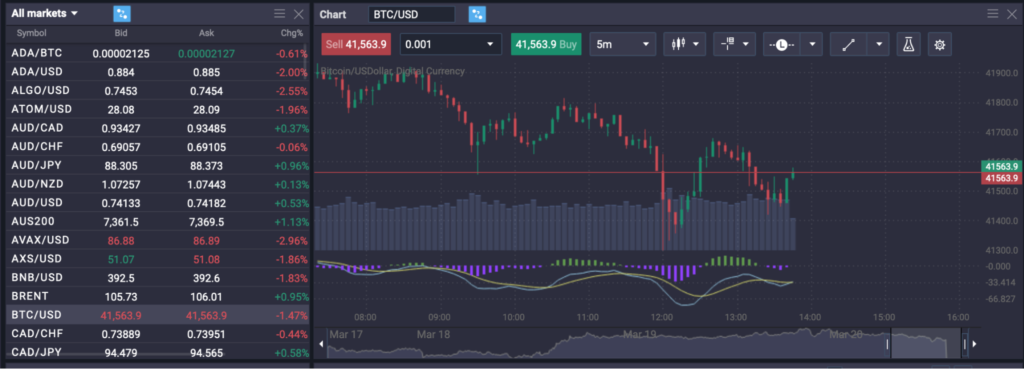
One can access a cryptocurrency trading platform through a web browser, a mobile application and third-party platforms. Some exchanges will have an all-around option that allows access from any device.
Open monitor and close your first position
Once you have created an account, you can start trading cryptocurrencies. The process of opening a position is the same for all cryptocurrencies. Each coin’s buy and sell price will be listed on the exchange.

You can choose the size of the position that you want to create. You can choose the buy option to create a long position or select the sell option to create a short position. You can also set stop and limit orders to protect you from taking a huge risk.
You can also monitor the profits and losses on your positions through your account. Once you decide it is time to close your position, you can do so by taking a position that will be different from your original one.
What are the strategies for trading cryptocurrencies?
Trading cryptocurrencies can be done in a wide range of ways. An individual’s strategy will depend on their trading plan and investment goals. A winning strategy allows you to know when to enter and exit positions. Below are the popular trading strategies for trading cryptocurrencies:
Arbitrage
Arbitrage in cryptocurrency trading is when a trader buys an asset on one exchange and then sells it on another exchange for a profit. An arbitrage trader will buy from an exchange with a low buying price and sell immediately to an exchange with a higher selling price.
Arbitrage can also be done through cryptocurrency pairs, where a trader can make a profit by taking advantage of the price difference between the matched cryptocurrencies. Arbitrage trading can be a complex strategy. The strategy guarantees the prices of cryptocurrencies between exchanges.
Bot trading
The other strategy is through using automated trading bots. A trading bot allows investors to buy and trade cryptocurrency at a predetermined time or when specific conditions have been achieved.
Automated trading bots are implemented to lower the possibility of loss and increase the chances of profits. These bots make it easier for a trader to keep track of the price movements and opportunities that increase the chances of profits.
Bots are not only used in the cryptocurrency sector but also in the stock market. They have been used in the traditional financial sector for more than a decade. However, they are mostly implemented by traders with knowledge about software programming and APIs.
Range trading
The other trading strategy is range trading. This trading strategy focuses on analysing the support and resistance levels. A day trader can use range trading to detect when a token has been oversold or overbought.
Range trading is favourable for cryptocurrency trading because it defines the entry and exit positions, lowering the risk of losses. A range trader also has a chance to liquidate their investment if there are unfavourable news in the market.

Scalping
Scalping is when a trader takes advantage of the small price movements to make profits. Scalping can be combined with bot trading because bots will allow a trader to make frequent daily trades to make slight gains.
Using bots with scalping crypto can be convenient because it takes away the stress of a trader constantly checking the price movements. Scalping also allows traders to analyse their profits and losses on a short-term basis. While the profits realised could be small, they could amount to large profits in the long run.

What are the styles of trading?
The different styles of trading cryptocurrencies include the following:
Day trading
Day trading is a technique also known as “Intraday trading.” Through day trading, a trader enters and closes positions during the day.
Pros
- Profits are realised after a short time
- A trader is not affected by overnight price movements
Cons
- Day trading can be addictive and result in an obsession with price charts
- Losses are realised faster
- It is hard for a trader to implement trading strategies within a day
- Trading decisions can only be made from short-term trends
- Intense volatility can induce stress
Swing trading
Swing trading is a short-term to medium-term trading style. A trader can trade between one day and a month.
Pros
- Easier to understand compared to day trading
- Lowered risk
- It is less addictive compared to day trading
- Needs less time to monitor trades
Cons
- Decision making depends on in-depth research
- Closing positions might be a harder decision
- Sticking to trading strategies needs more discipline
Position trading
Position trading is also known as trend trading. This trading style involves buying an asset and holding it for a long time.
Pros
- It is easy for slight mistakes to be corrected over time
- It is ideal for a beginner
- Easy to start with a small account and grow it with time
- Easier to make predictions
- It is not time-consuming
- It is not as stressful as day trading or swing trading
Cons
- Harder to diversify your portfolio with more assets
- It is risky to commit to a position for a long time
- A trader cannot reap benefits in the short-term
How to read the cryptocurrency market
Reading the cryptocurrency market does not need to be a complex process. It involves analysing the patterns and trends over time to help you understand when to enter or exit a position.
The crypto market can be either in a bearish trend or in a bullish trend. The bullish trend is when the prices are gaining steadily. A bullish trend or a bull market happens when the demand from buyers is high.
On the other hand, a bearish trend occurs when the crypto market declines steadily. A bearish trend or a bear market happens when the selling pressure in the market is high, resulting in increased supply and the prices decline.
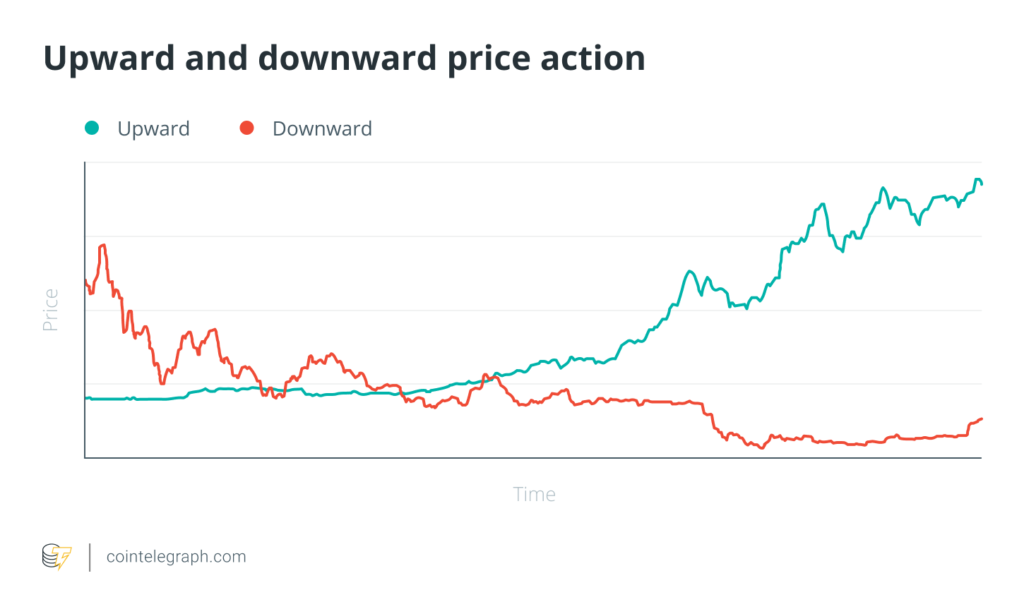
A bullish or bearish trend does not necessarily happen within a long timeframe. The trend can also be exhibited in the short term. In certain instances, a slightly bearish trend can be formed during a bull market and vice versa.
The cryptocurrency market is not always on a steady uptrend or downtrend. Sometimes, a lack of any significant price action can result in consolidation. A consolidation phase is when the price trades within a range. The price will consolidate after a steep uptrend or downtrend. Prices will also consolidate when trading volumes are low.
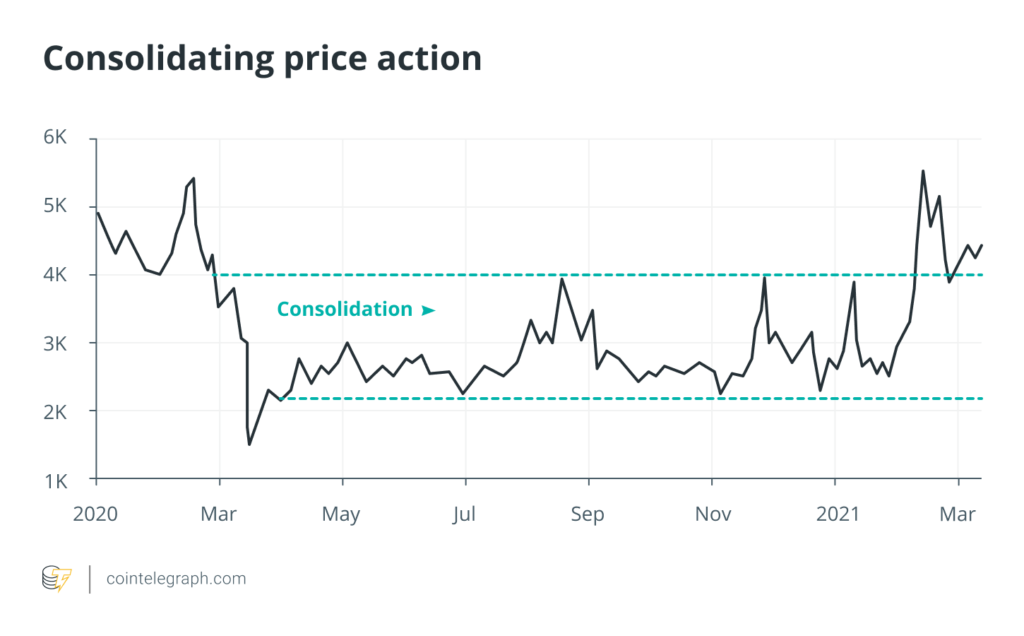
How can technical analysis help with crypto trading?
Expert cryptocurrency traders usually base their decision making on analysing the prices. Analysing the past market data is known as technical analysis. It involves analysing prices and volumes to predict future market prices.
Technical analysis usually involves implementing a wide range of tools and indicators. Below are examples of these tools:
Market structure and cycles
The past market data is just as relevant as the current market data. The market has a fundamental structure that makes it behave in a particular manner. The market cycle can be classified into four phases: accumulation, markup, distribution and decline, as seen below:
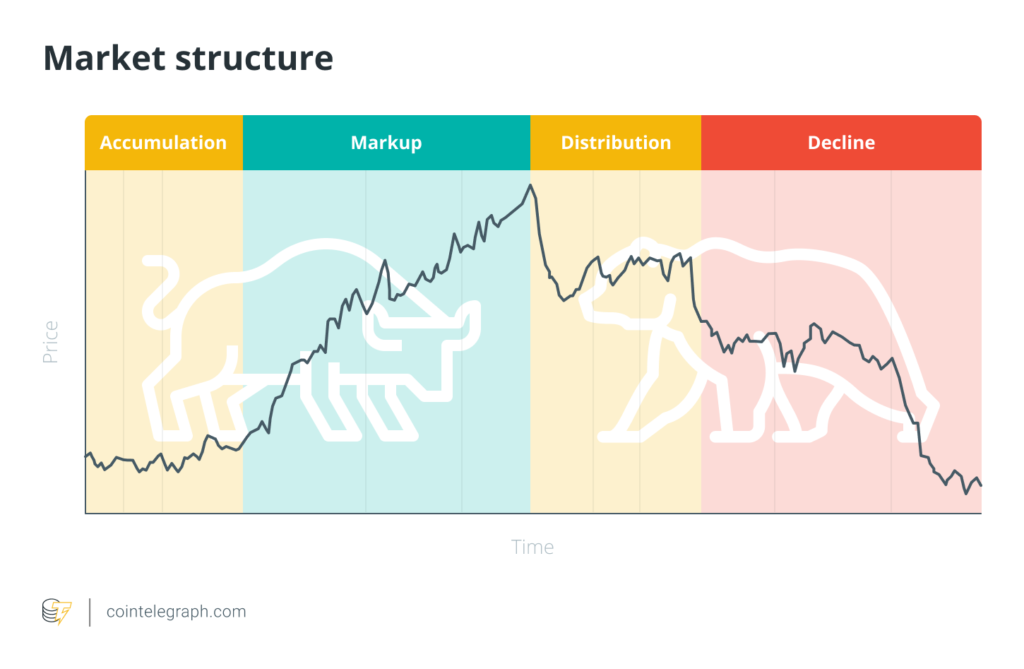
As the crypto market moves between the four phases, traders decide to open, close or hold their positions. By analysing these four phases, a trader will also know whether the market is bullish, bearish, or consolidating.
Technical analysis is recommended when opening new positions, but it can also come in handy in enabling a trader to decide how they will react during certain price movements.
Chasing the whale
The crypto market has a section of large wallet addresses that hold a lot of funds. These addresses are known as whales. Whales can act as market makers where they create liquidity in both the buying and selling sides while creating profits.
Whale addresses usually make informed decisions. Therefore, when adopting a cryptocurrency trading strategy, ensure that whales will also use it. When a trader can anticipate the action of a whale, they can make an informed decision to turn a profit.
Psychological cycles
Whether they are beginners or experts, cryptocurrency traders are susceptible to emotions. If these emotions govern their decision-making, the market prices can be affected. Below is a chart showing the psychology of a market cycle:
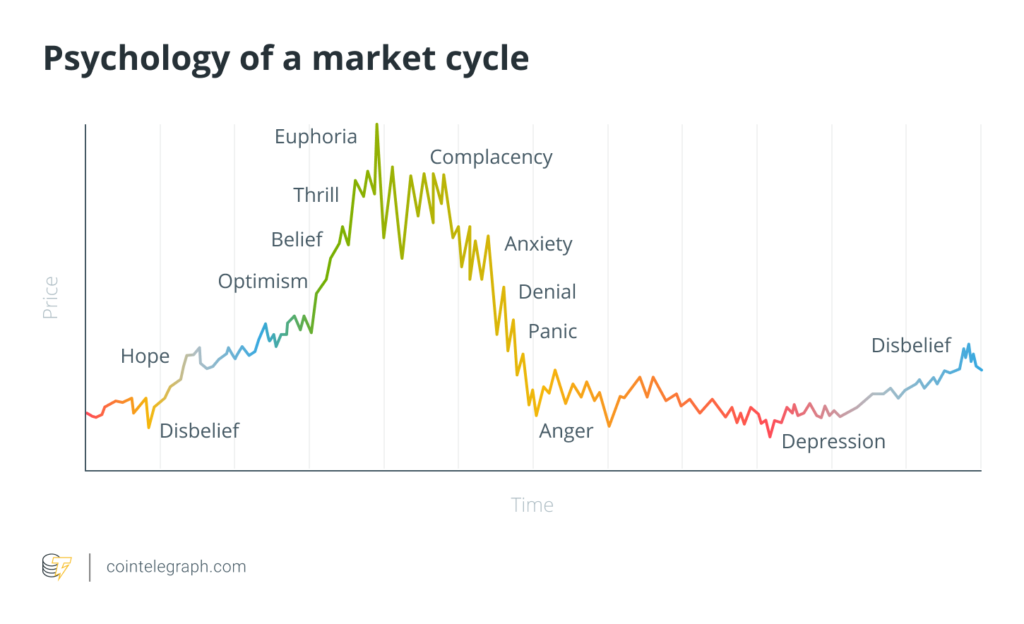
While independent analysis is useful, it is important to analyse the market sentiment to predict price swings. Trading out of emotions is highly discouraged, but traders are usually lured to make decisions out of group mentality.
The market will quickly rally from hope to euphoria due to the fear of missing out (FOMO). During this time, traders that have not yet created positions rush to benefit from the uptrend. Between euphoria and complacency, an expert trader will exit their position before the bear market kicks in.
“Dip buying” is a popular strategy, where a trader accumulates when the market prices are low. This usually happens during the depression stage after markets have made a deep plunge.
Not letting emotions dictate a trading decision can be a huge challenge to a trader. The crypto community is very active on social platforms, and news or analysis tends to spook the market. Moreover, whales can also manipulate prices. Therefore, do your own research before making any decision.
What are the basic tools?
You do not want to be the kind of trader that makes a trade without having a plan. Being proactive and not reactive is an important thing in the cryptocurrency space. Having a micro perspective about the market will allow you to determine your actual trading strategy. Below are examples of the popular technical analysis indicators in the market.
Support and resistance
The support and resistance levels are the two most popular technical analysis indicators used in the market. The two levels are price barriers formed in the market to prevent the price action from making a significant uptrend or downtrend.
At the support level, the downtrend pauses because of a rise in demand. Traders usually buy when the prices are low, and this action will create a support level. At the resistance level, the uptrend will pause as the selling pressure increases.
The support and resistance levels are used to speculate on the price movement. After a flow and ceiling level has been established, a trader can know the right time to create or exit a position. It is recommended to buy at the flow and sell at the ceiling.
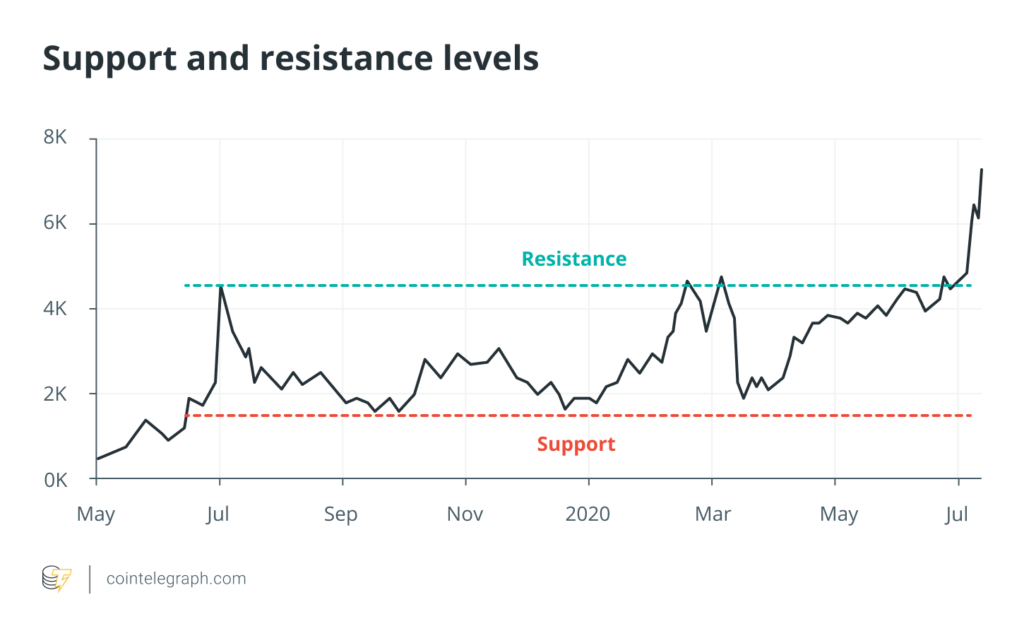
Support and resistance levels are inconsistent, as they change based on the price movement. Other levels will be created if the price breaks above a resistance level or below a support level.
Trendlines
The behaviour of the support and resistance levels can create a larger market trend outlined by a trendline. If the market is on an uptrend, resistance levels will be formed, slowing the price action. At this point, the price will retreat to the trendline. The same will happen during a downtrend, where traders monitor the support levels.
The support and resistance levels can change drastically. The strength of these levels and their trend lines will be determined if there is a high recurrence. These barriers will then lead a trader in decision-making.
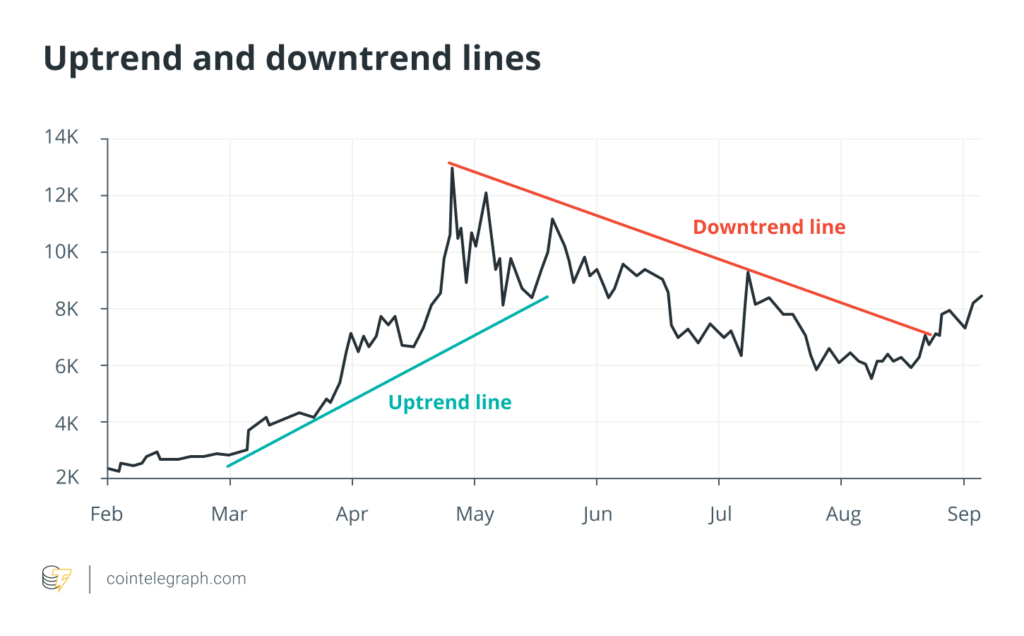
Round numbers
Inexperienced traders or institutional investors can be fixated about entering trading positions when the price hits a round number. For instance, Bitcoin’s price can fail to go past a figure such as $40,000 after creating a resistance.
The failure of a price to surpass such levels further shows that traders can make decisions out of emotions. Usually, the crypto market will be hyped when the price of Bitcoin reaches certain levels, which fuels demand and causes price gains.
Moving averages
The support and resistance levels and the trendlines formed can be analysed further to create one visual line representation. This representation is known as a moving average.
The moving average is an indicator of short-term price trends. A moving average is created when the bottom support level of an uptrend is traced with the resistance peaks during a downtrend.
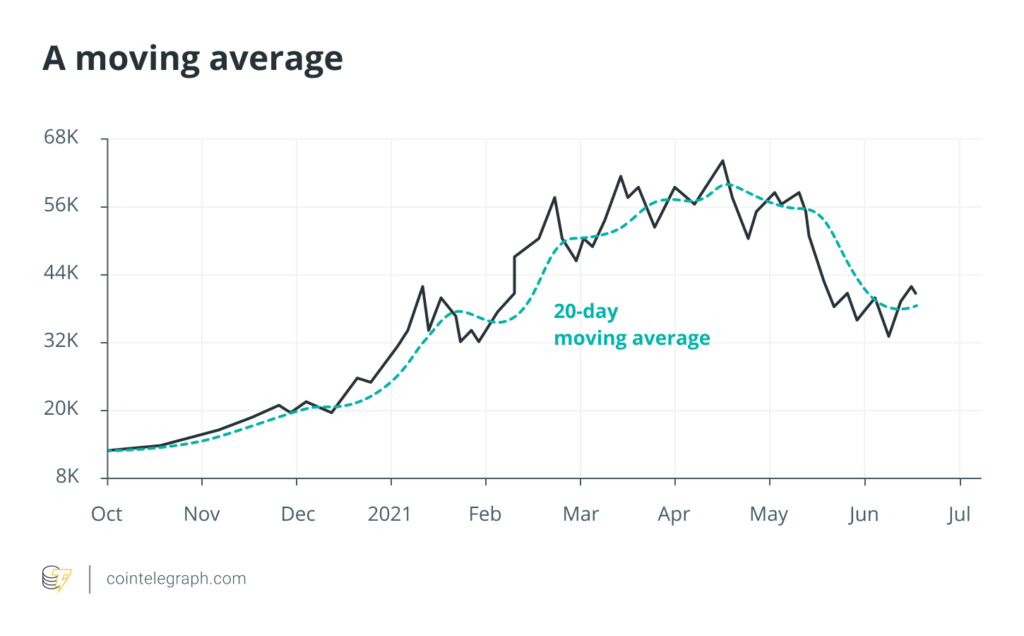
Chart patterns
Charts can also predict the future price movements of a cryptocurrency. One of the most popular ways to chart the crypto market is through a candlestick. Candlestick patterns are used to speculate on price trends.
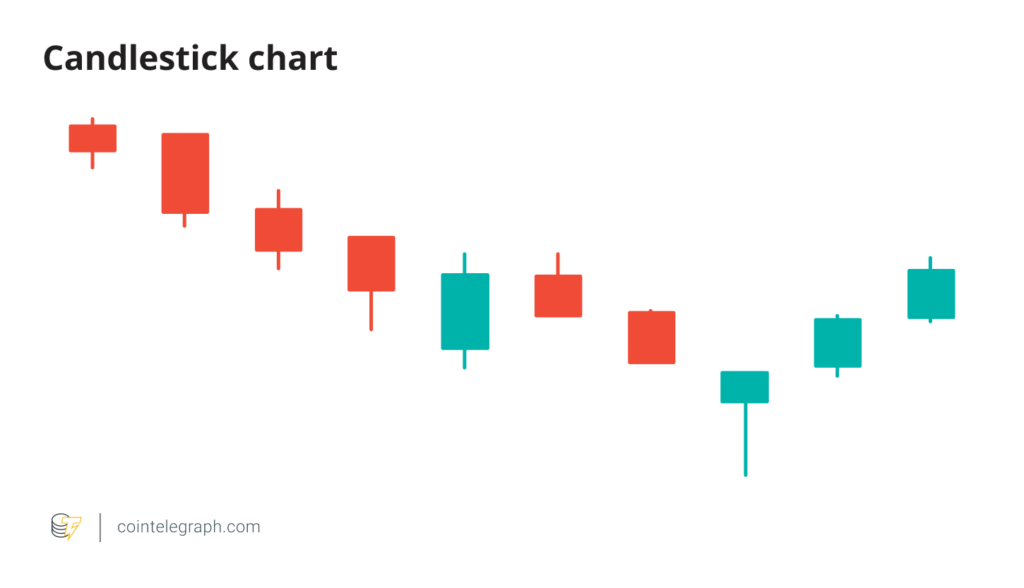
Candlesticks depict how the emotions of traders can influence price action. Candlesticks are preferred because they provide in-depth details compared to simple lines. A candlestick has four points: open, close, high and low.
The candlestick is analysed by its width, length of the wick and colour. Candlesticks will show the performance of an asset within a given timeframe, and the pattern will change depending on the selected duration.
How can Fundamental Analysis Help with Crypto Trading?
Fundamental analysis involves studying the components of a market, such as the underlying technology, industry, technology or assets. The cryptocurrency market is large. The two most popular cryptocurrencies are Bitcoin and Ethereum, and they comprise the majority of trader portfolios.
However, traders are also interested in new assets that show growth potential. Before investing in any new asset, it is important to conduct a fundamental analysis by considering the following factors:
Developers
Every cryptocurrency has a team of developers behind it. Before investing, ensure that you research those who have built the cryptocurrency and look into whether they have the integrity and capability to sustain it.
It is imperative to look if the developers have been involved in any other software ventures in the past and their track record in these projects. Most crypto projects are open-source, and you can monitor the activity of these developers to see if they are active in developing the network behind the token.
Community
The community is also a critical part of any cryptocurrency project. The community comprises the users of the underlying network, token holders and other people that generally support the project.
The community is a pillar that supports any new technology. However, there is always the risk of the community being disrupted by non-professional investors or disagreements. Therefore, you should research health and transparency before investing in a token.
Technical specifications
Technical specifications are the features of the network underlying a token. The technical specifications of this network will include security, performance and consensus. You should also monitor the block times and tokenomics.
Assessing the underlying network of a token before investing in it allows a trader to understand if there is the potential of their investment growing in the short and long term future.
Innovation
Blockchain technology has greatly evolved from what it was when Bitcoin was created. Developers have found a new use case for blockchain technology, and now, the market is filled with protocols with unique applications.
Liquidity (and whales)
Liquidity is definitely worth considering because it guarantees you can easily settle your trades. Before investing in a token, research the exchanges that support it and the trading pairs available. You should also monitor the trading volumes and any whales in the market.
However, it is not easy for a new token to generate liquidity. Investing in a new token that has low liquidity is risky. If you invest in a token with relatively low trading volumes, you speculate that the underlying project will grow and attract new investors.
Branding and marketing
Most cryptocurrency projects are usually focused on technology rather than branding and marketing. It is rare to find an innovative project with a team entirely dedicated to marketing.
A project’s marketing is usually developed with time. The project’s community, including developers, users, and token holders, will promote the token to new investors. The marketing is usually done by advertising the solutions that the project can provide.
On-chain analysis
All cryptocurrencies operate on blockchain technology. An on-chain analysis is done using data collected from blockchains. Analysis can use the demand and supply trends, frequency of transactions, transaction costs, and investor behaviour to understand the underlying blockchain network’s price dynamics and strength.
On-chain market data offers valuable insight into investor behaviour. The action of investors is recorded on the blockchain. An on-chain analysis is used to make price predictions as investors will react to news of network upgrades, reduction in token supply and the developments happening in the traditional financial sector.
Tips for trading cryptocurrencies
If you want to trade cryptocurrencies, you need to use the following tips:
- Diversify your portfolio: the first tip is portfolio diversifications. Invest in different cryptocurrencies as a way of managing risk. Investing in a single cryptocurrency exposes you to significant financial loss.
- Do your own research: the crypto community is very active in social spaces. As an investor, it is easy to be swayed by the community discussions. Nevertheless, focus on your own research before making trading decisions.
- Invest what you can afford to lose: the crypto market is highly volatile. Even with in-depth analysis, you are not always guaranteed that the market will move as predicted. Therefore, only invest money that you can afford to lose.
- Buy when the price is low: It is also advisable to buy when prices are low. Dip buying guarantees you have a chance to watch your investment grow.
- Manage risk: as the crypto market is highly volatile, you should focus on the ways you can manage risk. Risk management allows you to minimise losses in case the prices plunge.
Why trade cryptocurrencies with AMSTERDAX
Prime XBT is one of the best exchange platforms. This award-winning avenue gives beginner and expert traders the best way to venture into cryptocurrency trading.
- Copy Trading: AMSTERDAX has a copy trading feature. Copy trading allows a become trader to follow the techniques of an expert trader to help make informed decisions.
- User-friendly interface: AMSTERDAX has a user-friendly interface for beginner and expert traders. The platform offers the best way of trading crypto without the complexity of navigating the site.
- Best trading fees: the trading fees charged at AMSTERDAX are highly competitive. You get to enjoy your profits without worrying about heavy deductions in terms of fees.
- Price charts and tools: The best way to trade cryptocurrencies involves analysing price charts and tools. These tools are available at AMSTERDAX to make your analysis easier.
How do you open a cryptocurrency exchange account?
You can open a cryptocurrency exchange account the same way as opening any brokerage account. To open the account, you need to provide your name and email address. Some exchanges need to verify these details by asking for proof of identity and a proof of address.
How do you buy cryptocurrency?
You buy cryptocurrency from an exchange. To buy, you place an order on an exchange, where your order will be fulfilled at the market prices.
Is cryptocurrency trading 24/7
The crypto market is open 24/7. It is possible to trade crypto during the day and night.
How many cryptocurrencies are there?
There are more than 10,000 cryptocurrencies. The growth rate is quite high, as new coins are introduced every month.
Do you pay tax on cryptocurrency trading?
In some countries, you must pay tax on the gains made from cryptocurrency trading. Research about the crypto regulations in your country to find out if there is a tax and, if so, the percentage you have to pay.